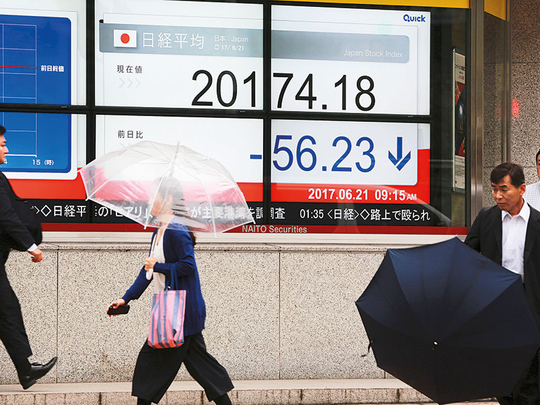
The investor demand that’s underpinning record Asian junk bond issuance is also showing up in looser deal terms.
When Kaisa Group Holdings Ltd. this month offered to swap old bonds for $2.86 billion (Dh10.5 billion) of new ones, the developer tweaked a covenant to give it more room to raise debt. Marble II, the issuing entity for an Indian IT firm, sold $500 million of bonds after getting the weakest score from Moody’s Investors Service on a covenant known as cash-leakage protection, which safeguards against executives moving company assets out of the reach of bondholders.
“In each relaxation of covenant, there are tons of reasons given to investors,” said Raymond Chia, head of credit research for Asia ex-Japan at Schroder Investment Management in Singapore. “And when we let this go through, it sets precedence for another to follow, quoting as standard market practice.”
Concerns are growing that bond investors are sacrificing safeguards in their chase for higher yields amid record issuance of speculative-grade bonds in Asia outside Japan. Borrowers may come under financial stress when markets turn, said CreditSights Inc. Companies in the region have raised $31.8 billion from such offerings in 2017, versus $4 billion in the same period a year earlier, Bloomberg-compiled data show.
The average quality of Asian junk bond covenants weakened in the first quarter this year, with the score at the lowest since the last three months of 2015, a Moody’s Investors Service report in April showed. The score is based on assessment in six areas: cash leakage, leverage, investment in risky assets, liens subordination, structural subordination risk and change-of-control.
“It’s a real concern in the Asian market that covenant complacency can set in while hunting for yield,” Alexander Diaz-Matos, an analyst at New York-based Covenant Review LLC, said in an email interview on June 15.
At Noble Group Ltd., buyers didn’t demand stricter covenant terms typically associated with junk bonds when they soaked up its $750-million offering in March, before the commodity trader suffered another liquidity crunch.
Investor demand
There are no shortage of investors willing to take the terms as a four-year rally in Asian credit drives spreads to near decade lows. The yield spread on dollar bonds from issuers in Asia outside of Japan narrowed 56 basis points in the past year.
Marble II’s cash leakage protection score of 5, the worst, compares with Moody’s average of 3.14.
Its covenant package allows unrestricted subsidiaries — entities bondholders have no control over — to use assets transferred by Marble to make payments that the issuer wouldn’t be allowed to make directly, said Covenant Review’s Diaz-Matos.
The term “is off-market and exactly the type of provision investors should resist as it undermines their covenant protection,” he said.
An external spokesperson for Marble II could’t immediately respond to an email seeking comment.
Investors and lenders have pushed back on aggressive clauses in the U.S and Europe, including the advent of “no premium on default” language in debt indentures.
Superior Industries International Inc. was said to amend covenants in a euro-denominated bond sale this month, after the Financial Times reported that investors had flagged concerns. Investors have also litigated on J. Crew Inc.’s plan to divest intellectual properties to units beyond their reach, potentially reducing their recovery value in case of distress.
Familiarity has bred complacency, according to R. Lakshmanan, a senior research analyst at CreditSights in Singapore.
Some Asian high yield borrowers are repeat issuers, who have placed tight covenants when they first entered the bond market some years ago, he said. As investors become familiar with the borrowers and their repayment track record, these companies are diluting their covenant thresholds, he said.
“We have seen a certain degree of covenant weakening in the Asian credit space,” said Lakshmanan. “It could lead to a situation when markets turn, financial profile deteriorates and companies find themselves in stress.”












